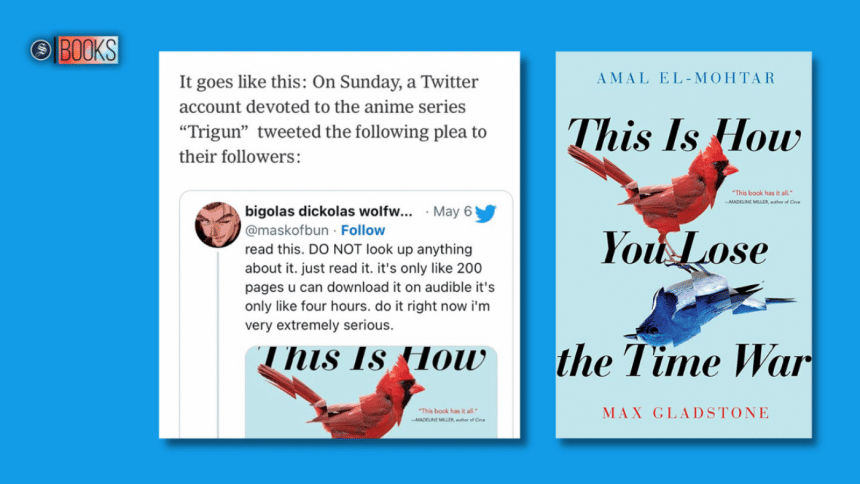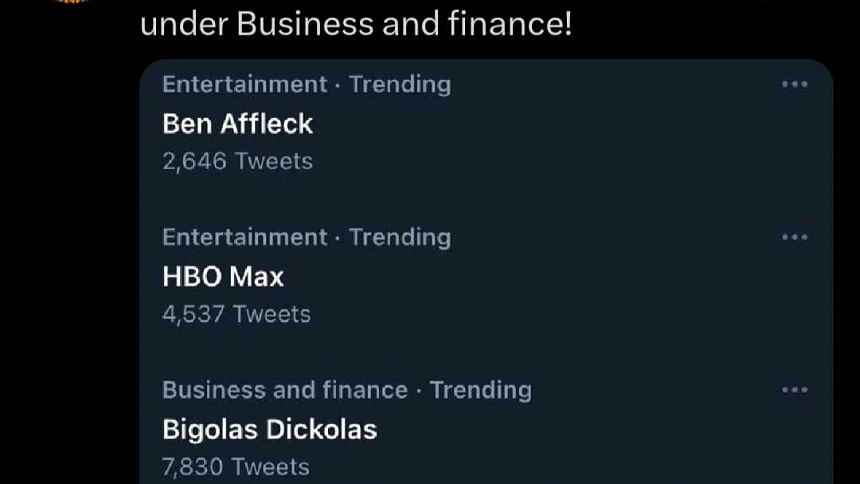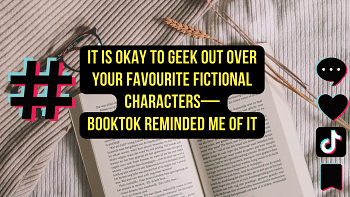Bigolas Dickolas and the power of a heartfelt ‘Read this NOW’

In the past few years, one of the more remarkable internet phenomena has been the speed with which something that finds virality is swept up and co-opted by marketing agencies. It has given us both the initially amusing but now played out shtick of brand accounts feuding with each other on social media, and the painfully cringe results of corporations trying to capitalise on the latest internet memes/trends. The latter, with its "hello fellow kids" approach and half-baked understanding of meme culture, has long been deemed an effective measure of when a meme can be declared dead.
These death knells are inevitable in an online and social media ecosystem where every moment of virality must be squeezed for all its worth. The irony of it all, however, lies in the fact that most viral moments are wholly irreplicable because of the unique circumstances they are a product of, and whatever ensues can imitate them in style, form, and content as much as it pleases without ever reproducing the same reaction or engagement.
The most recent example of this has been a tweet from Twitter user @maskofbun, who took to Twitter in the middle of the night to passionately recommend a book he had just finished reading. The tweet, accompanied by the cover of the book in question, This Is How You Lose the Time War (2019) by Amal El-Mohtar and Max Gladstone, read:
"read this. DO NOT look up anything about it. just read it. it's only like 200 pages u can download it on audible it's only like four hours. do it right now i'm extremely serious."
It was not a tweet unlike hundreds of thousands of others flung on to the Twitter feed daily, especially by fans. But for whatever reason, the tweet blew up, amassing 17.6 million views and 144,000 likes at the time of writing. At the height of this snowball effect, it also propelled This Is How You Lose the Time War to #3 on the Amazon Bestseller list nearly four years after its publication. In several parts of the world, the book sold out after the Tweet went viral, and has sent publishers and marketing agents scrambling to make sense of it all.
Big names like Simon & Schuster left comments like "Hello from S&S corporate marketing!" below the original tweet, hoping perhaps to jump on the bandwagon. Several bookstores have placed gimmicky stickers and signs on their copies of This Is How You Lose the Time War with phrases such as "As recommended by 'B.D. Wolfwood'", in a similar fashion to how books often feature "Pulitzer Winner" or "Winner of the Booker Prize" stickers on their covers. Speaking of Pulitzers, several online media outlets also called the @maskofbun's tweet more influential than the Pulitzer at increasing sales. A TechCrunch article pointed out that the novella had shot up to a higher place on the bestseller list than Demon Copperhead by Barbara Kingsolver, which only recently won the Pulitzer Prize for Fiction.

Unlike BookTok, Book Twitter is generally not thought of as a platform that can drive sales, and therefore not taken into as much consideration by agents and distributors; as a result, Book Twitter discourse is largely free of ruthless corporate soliciting for paid collaborations. This only makes the Bigolas Dickolas event even more intriguing. Several emerging authors and creators have also been seen to tweet about waiting for their very own "Bigolas Dickolas moments", which gives rise to the question of what exactly led to something as simple as this tweet garnering attention of such a scale. Just to put it all into context: this was a fan account named (with an innuendo) after a character from the 90s manga/anime Trigun, which has been out of print for years, tweeting about an epistolary sapphic, time travel novella published in 2019 to critical acclaim.
A BookRiot article remarked that this was "a complete fluke, something that is impossible to replicate," and yet, it got to "the heart of what is so great about bookish social media at its best: the unbridled enthusiasm." When it came to social media marketing, Bookstagram used to be the platform for recommending and blogging about books, but its hype (and thus influence) most likely began to decline sometime during the pandemic, only to be replaced by BookTok and its immense popularity.
However, ever since BookTok made it big, leading several books to go viral and become bestsellers, its contents have been flooded with filler videos intended to appease the algorithm. Where such uninspired filler itself has not driven away a part of the reader and consumer bases, BookTok's reliability suffers because of creator reviews becoming increasingly commercialised due to paid partnerships with companies only interested in driving sales; this has led to fans and followers trusting the recommendations of book influencers far less. In a way, corporations' vested interests stripped BookTok of the traits which made it capable of fostering bookish communities and spreading the word in the first place.
It was perhaps precisely this gap that was filled by Bigolas Dickolas Wolfwood's heartfelt recommendation on Twitter. It reminded me of the Bangladesh Bookstagram scene that once was, fuelled by word of mouth and posts from voracious readers all across the platform. In this way, the whole phenomenon is beyond even attempted replication. In the words of Twitter user @arctvros, "you can't replicate this kind of traction from the inside bc you can't manufacture a genuine sense of joy and community".
For those willing to see what all the hype is about, This is How You Lose the Time War is set in a post-gender world, categorised as queer sci-fi romance.
The incident also speaks to the power and creativity of fan culture, as the co-existence of Trigun and Time War in many of the same spaces now has resulted in fanart and cosplay featuring crossovers between the two fandoms. The authors of This Is How You Lose the Time War, and Amal El-Mohtar in particular, have been tuned in and engaged with the situation, following and hyping up every little development in either fandom.
As for @maskofbun, not only was he interviewed by the likes of Gizmodo and The New York Times, but Bigolas Dickolas and the power of mutual support were most recently mentioned at a speech during the prestigious Nebula Awards as well. The incident has also been given its very own Wikipedia section. He even caught the attention of Yoshihiro Watanabe, producer of Trigun Stampede, who tweeted that he too had caught wind of the drama and bought the book. Amal El-Mohtar has likewise tweeted about getting around to watching Trigun.

However, perhaps Bigolas Dickolas Wolfwood's most significant claim to fame (after, of course, his Time War recommendation) was perhaps his very own "Victor Hugo saves Notre Dame" moment. When he tweeted at Dark Horse Comics, gently nudging them to reprint the Trigun manga and even offering to "do all the promotions and marketing", Dark Horse was led to break the news that a reprint was already in the works, sending the manga/anime fandom into a frenzy.
It is interesting how not one, but two pieces of media that did not have much traction beyond their own fandoms had suddenly skyrocketed in popularity — Time War due to the recommendation, and Trigun for merely being associated with the recommender's account. When it was first published, This Is How You Lose the Time War had been well received, especially by critics as it went on to win the Hugo Award, the Locus Award, and the Nebula Award for best novella. Other than that, it largely flew under the radar until Bigolas Dickolas came in to save the day.
For those willing to see what all the hype is about, This is How You Lose the Time War is gorgeously written, with lyrical and poetic prose meditating on love, life, and history as it follows Red and Blue through time and space and their attempts to thwart each other's schemes, but gradually and increasingly fall in love. Although it is set in a post-gender world, the book is categorised as queer sci-fi romance and, as an avid lover of both queer fiction and all possible sci-fi subgenres, has long been on my own list of "READ THIS NOW" books.
This is also not the first time a book of queer fiction made a resurgence in literary markets due to social media recommendations. A year or two ago, The Song of Achilles by Madeline Miller found widespread fame through TikTok, leading not only to skyrocketing book sales but also the indisputable establishment of BookTok as a platform capable of doing so.
While this incident and all that followed might sound like terminally online drivel to some, it is the current reality of the book and publishing industry that social media dialogue has the power and influence to significantly impact how the industry operates. In many ways, Bigolas Dickolas, the unprecedented success of a single Book Twitter incident, and the decline in trust and credibility among BookTok followers has shown corporates and companies much of what works and what does not.
It is now up to them to decide whether they will learn something from the evident chaos and unpredictability of the internet, as well as the power of community building and feral fan enthusiasm, or merely try to recreate and bank on another Bigolas Dickolas moment.
Amreeta Lethe is an intern at Star Books and Literature and the Editor-in-Chief at The Dhaka Apologue. Find them @lethean._ on Instagram.

 For all latest news, follow The Daily Star's Google News channel.
For all latest news, follow The Daily Star's Google News channel. 









Comments